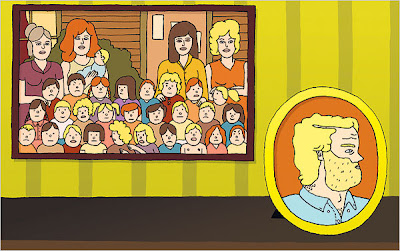 |
| still from the book trailer |
Reviewed by Christina
[Read Megan's review of the print version here.]
Published: 2011
It's about: The story opens after Lizzie and Darcy have been married for several years. Elizabeth can't seem to muster up much excitement about life now that she is A Gentleman's Wife; social mores bar married ladies from doing battle with Zed-words. Just a few minutes into the book, a child dreadful attacks and bites Mr. Darcy and his wife enters into a humiliating plot to save him. The mastermind behind said plot is Lizzie's formidable foe, Lady Catherine de Bourgh. Can Elizabeth secure a cure for the Zombie Plague before it's too late?
I thought: As you may know from my reviews of the original P&P&Z and its prequel, Dawn of the Dreadfuls, Dreadfully Ever After is the third and final book in the zombie mashup trilogy. It's written by the same author of Dawn, not the same as the originator of the series, Seth Grahame-Smith, who first inserted monsters into Jane Austen's British regency-era world.
So I was pleasantly surprised to find that I liked everything about Dreadfully Ever After far better than Steve Hockensmith's previous contribution. Honestly, everything is better in Dreadfully as compared with Dawn: pacing and plotting, character development, general originality, humor. I just really liked this audiobook. It kept my attention through many a mile of running; it didn't sag or become tiresome. I even laughed! While running! That is quite an achievement, Mr. Hockensmith.
If you are a big P&P fan, I think I'd recommend the zombie sequel less for its undead action and more for its development of two previously minor characters: Kitty and Mary Bennet. Both are in their early twenties in this story, likely on their way to spinsterdom (their mother has given up matchmaking- she needs caretakers in her old age, not more married daughters abandoning her). But Kitty and Mary contribute at least as much to Darcy's rescue as Elizabeth does, and they become full-on people. Their character trajectories made sense and amused me, even if I doubt they are very similar to anything Jane Austen herself would have devised.
Katherine Kellgren, the reader, does a fabulous job as ever. She is hilarious. There is one character with an extremely exaggerated Scottish brogue, and his endlessly rolled r's did get on my nerves after a while. But not terribly so; I enjoyed mentally casting King Fergus as him, and imagining his son looking something like a dandified Young Macintosh. Good times.
Verdict: Stick it on the shelf!
Reading Recommendations: Read them in order for the best experience. Even though I didn't love the first P&P&Z installment, I still think most readers would like the trilogy best in its entirety.
Warnings: Zombie gore.
What I'm listening to next: Matched by Ally Condie







_-_200px.jpg)














